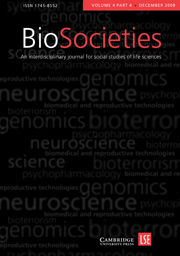Article contents
‘Race’ and Ethnicity in Science, Medicine and Society
Published online by Cambridge University Press: 25 October 2006
Abstract
Human genome research has indeed re-ignited the sparks of long-standing discourse and debate on the definition, measurement and existence of human ‘races‘. On the one hand, this genome revolution is increasingly challenging the notion that the groups traditionally called races are truly and innately biologically distinct (Jorde and Wooding, 2004; Tishkoff and Kidd, 2004), yet, on the other, one could argue that it is facilitating the reification of race (Duster, 2005). While it is undeniable that the latter part of the twentieth century ushered in a scientific era brimming with new technology, new data and new terminology, many elements of the ‘race and biology’ controversy are not at all new and still it appears that a resolution is not yet within reach. One might ask: ‘Why?’ ‘How will current knowledge about human genetic variation inform the treatment of race and ethnicity in science, medicine, and society?’ ‘Is it even possible to come to consensus on some of the fundamental issues?’
- Type
- Articles
- Information
- Copyright
- 2006 London School of Economics and Political Science
- 2
- Cited by


